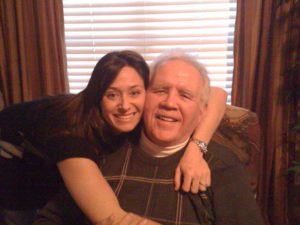Play Therapy at Home, Day 11: Fear and Loss
I have been thinking a lot about loss this week. Not only are some of your families dealing with loss in various ways, Fort Stewart lost more soldiers this week in Afghanistan. I used to refer grief issues to other therapists. At the time, I had not lost anyone close to me, I didn’t feel like I could relate enough to someone coming to me for help. But after walking through the swamp of sadness (Neverending Story) with others enough times, you begin to realize that grief is something we all can relate to. All of us have lost something- a loved one, a pet, a dream, a relationship. The feelings that come with that loss are mostly the same, just heavier the closer the person was to you. If you are not careful, the overwhelming feelings of grief can cause you to fear death- or rather feeling overwhelmed at the thought of the emotions that follow. I know I was tempted to be afraid and know others who struggle with anxiety that keeps them from living fully in the moment. I am going to share a technique with you, but I think it is more important to share thoughts and words. It is often the conversations with our children that are the most healing.
Helping children cope with loss is a family issue, not just one with the child. Ultimately, it brings up what you as a family believe about loss, death, and what happens after death. It is full of teachable moments with your children where they are needing to be taught the answers to those questions. If you don’t know the answers yourself, you will find yourself struggling and unable to walk into that swamp with them. There is no escaping suffering in this life, and grief eventually will become a friend of ours. That doesn’t have to seem depressing- in fact- I think it is in the pocket of grief that we are truly alive. The overwhelming feeling of grief is evidence that we loved someone, something, or had hope in something. What a wonderful thing to say! That overwhelming feeling of heartbreak is not something to fear, it is something to fully embrace and experience- it is what connects us that point forward with the person we lost.
I tell families all the time that if you don’t allow yourself to feel, those feelings don’t go away. You push them down and pack them in. Like a Coke bottle, they will eventually leak out or explode when life shakes you up (sometimes on a daily basis). Letting it out in healthy ways releases the pressure and gives you a better perspective on everything. So, when working with the child, encouraging them to fully cry when their emotions are pricked will let out some of the pressure. I don’t know about your kids, but Aidan seems to only feel his emotions when he is triggered by something- it is then that everything else that he has been feeling comes out with it. One good cry and he feels better. Jack on the other hand, will handle disappointment by thinking up everything else under the sun to also be upset at and snowballs. I remember his feelings getting hurt by someone and him crying about how he never got a yellow umbrella- A yellow umbrella? He never asked for a yellow umbrella! The point is, sometimes our children will have their emotions pricked by hurt feelings at school or disappointment and everything else will come out. Instead of pointing out their irrational thoughts, consider letting them release the pressure and talk about it with them afterwards. We adults do the same thing, bickering with our spouses, gossiping about others, and snapping at our children- all because there is something else going on inside.
I would definitely recommend some of the previous play therapy techniques in the previous days to sort out the feelings the child is having. I love to have children draw where their loved one is and talk about what it is like there. Often times, you will hear children want to go there and be with them. This doesn’t have to be alarming- it is their concrete way of processing their loved one being in a different place. When Daddy is on a business trip (and is not physically in front of them), it makes sense to fly on a plane to see him- why not take a plane to Heaven?

 When my Granddad passed away, it was hard on all of us. I knew this was going to be my first experience of intense loss and had feared it for a long time. Matt has been amazing in walking me through it all and I have learned so much from him. After losing several friends in Afghanistan, he had already walked hand in hand with death. When it came time, I can look back and say I worked hard to take his advice as well as my own. I fully embraced those moments of initial loss. I didn’t try to be strong for anyone (unless I felt capable and wasn’t pushing things down) and made sure I let my children see me cry, saving the worse for private moments. I can honestly say that I can look back on that time as a sweet time between me and my Granddad.
When my Granddad passed away, it was hard on all of us. I knew this was going to be my first experience of intense loss and had feared it for a long time. Matt has been amazing in walking me through it all and I have learned so much from him. After losing several friends in Afghanistan, he had already walked hand in hand with death. When it came time, I can look back and say I worked hard to take his advice as well as my own. I fully embraced those moments of initial loss. I didn’t try to be strong for anyone (unless I felt capable and wasn’t pushing things down) and made sure I let my children see me cry, saving the worse for private moments. I can honestly say that I can look back on that time as a sweet time between me and my Granddad.
When a loss doesn’t happen naturally, but suddenly and with unanswered questions, the grief that follows is often called complicated grief. The normal grief process is dragged out, can effect the community of support, and leave a person with far more questions that answers. Reflecting on the connection with the one we lost can help ease the pain when it is triggered again and again. I encourage parents to help the child make a book of positive memories through art, photos, and stories that will help bring back memories that will fade over time. It can be kept in a safe spot and taken out periodically when needed and given as a gift when the child is old enough to care for it.
After encouraging your child to feel his or her feelings, it is important to communicate what you believe and want your children to understand about death. Talking to them and finding out what they have heard from other adults is important, as they may have heard conflicting things from others. Sometimes children will explain death to me and use adult language they overheard, all the while not understanding any of it. Here are some questions to think about when talking to your child. By the way, we adults struggle with these too, so getting help to resolve these within your own life may be simultaneously important:
- How can this person be both in Heaven and in the ground at the same time?
- Someone said God wanted her with Him, why would God take her?
- Will it happen to me?
- Will it happen to my parents?
- Can I pray to him or her?
- If Heaven is such a happy place, I want to be there too.
You may see your child regress and have some separation anxiety- this is normal. Giving your child a sentimental object to hold on to is completely okay. The thing your want to look out for is whether it is interfering with their functioning after the initial stage of grieving. Can they go places without it where it wouldn’t be appropriate? Helping them wean when they are ready will be a healthy part of the grief process as they begin to transition from the object as connect with their loved one and instead through memories. This is similar to a security blanket and can relieve anxiety if grief is coming out as fear. Think about weaning your child from a pacifier- it will be a similar experience of patience and understanding.
One of the best things Matt prepared me for was how much easier it would be to connect with my Granddad after he was gone. I didn’t get it until after, but there is something comforting about connecting with him whenever I think of him now, and not having to try to call him on the phone- and that is something special. Some people feel better “talking” to the person they lost- not necessarily because they feel they can actually hear them, but because their spirit is not contained in the body anymore. Sometimes not having all the answers to the afterlife gives us the freedom to do what we need to do to grieve.
One of my favorite techniques is using balloons. I remember doing this technique with adults as well and it seems to work no matter what the age.
It’s very easy. The child can write a letter or draw a picture to give to their loved one. Take it to your local grocery store and ask them to stuff it inside a helium balloon. Let the child release it! As easy as it is, there is something wonderful about releasing those words and feelings into the sky. Parents sometimes look at me like “Is this really going to help?” and then come back in tears saying it was powerful for the whole family. Even when you are old enough to know that your letter isn’t actually going to “get there”, it still feels somehow like it does. Let the younger children believe it- there is something powerful in the imagination!
You can also do variations of this technique more frequently if you’d like:
- Writing letters and burning them
- Writing a message on the loved one’s social media page
- Sitting with others who are grieving the same loss and sharing stories
Don’t forget anniversary dates. There is an internal clock in our bodies that we are not conscious of. Have you ever had a rough day and then looked at the calendar to find out it was an anniversary of a loss or tragic moment in your life? Mark your calendars so they don’t surprise you or your children. Plan both meaningful events and unrelated events that get you out of the house and with other people that day. Step in, feel the connection, and then give yourself opportunities to step out of it.
Here are a few resources that I like:
For an incredible list of statistics on children and grief:
National Poll of Bereaved Children
A Developmental Chart on Children and Grief
A List of Do’s and Don’ts When Talking to Children About Grief
Brene Brown gave an EXCELLENT Tedtalk on anxiety that keeps us from experiencing joy:
{youtube}_UoMXF73j0c{/youtube}
Click Here for iPhone, Ipad, or Apple products
